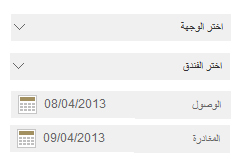Translation of Hotel Booking Engines and Tourism in the Middle East
As per World Tourism Organization (UNWTO) World Tourism Barometer (September 2012) international tourism flow to the MENA region was reduced by 7% (2012) and 9% (2011) compared to 2010. Tourism to the region further declined in the wake of the Arabic Spring crisis.
Despite the negative trends for some MENA countries (Egypt -32%, Tunisia -31%, Lebanon -24%) some other countries in the region release positive indications such as Saudi Arabia +61% and UAE +9%. Furthermore, over US$6 billion has been dedicated for hotel development projects during 2013 in UAE, Saudi Arabia and Qatar. A broader view of current tourism trends in the MENA area shows a growth of 5% during 2012 and expects more positive progress subject to political and economic stability. (source: World Tourism Organization (UNWTO))
Arabic Translation and Tourism: Translating booking engines
Based on Arabian Travel Market (ATM) seminars, a regional authority on Arab travel, there is a dramatic shift towards online booking against traditional methods and this is expected to grow by US$5.4 million for 22% of total travel bookings within two years. The growth in the online booking trend for international travelers to the Middle East totals US$10 billion with an increase of 31% in 2012 in comparison with 2011.
Online booking is booming for the MENA region fueling a growing need for translations to meet the demands of travelers from different areas of the world. A booking engine fully localized into local languages can attract higher traffic of website visitors looking for localized content and tourism information in the MENA region including information on hotels, flights, offers and deals.
Thus the influence of the internet and e-business is currently playing a crucial role in tourism worldwide and especially in the MENA region. As the main objective is to encourage people from everywhere to visit the region, a good website well localized and user friendly can achieve this goal. Based on tourism studies, the linguistic quality of a tourism website and the degree the website content has been localized reflect upon the quality of the business or services offered.
Localizing Booking Engines Challenges

Booking engines are always built using different content management systems (CMS) because a CMS facilitates the process of storing, authoring and publishing content. In order to localize a booking engine into Arabic the Internationalization (I18n) process is a critical step before localization (L10n). Internationalization must be completed in order to avoid many localization issues and provide a professional and user friendly localized version of the application without limitations or restrictions to a specific type or number of languages.
Internationalization process may include:
- Enable multilingual features in the CMS or applying globalization structure if it’s a custom application.
- Make sure that input fields are unique per language to reflect the correct language.
- Enable target languages in the CMS.
- Extract all static content from web pages into resource files.
- Handling dates and currencies’ formats which are critical for a booking engine.
- Develop accurate CMS templates to handle Arabic content correctly such as reading from right to left, accept Arabic characters inputs in standard text fields.
- Conducting a Pseudo translation process which is very important step before starting localization in order to fix as early as possible any issues before translation begins.
Once the internationalization process is done, the booking engine should be ready for localization which is the process of exporting the content for translation and re-importing the language versions back. Based on the CMS features, content may be exported manually, using a CMS’s built-in tool or using a custom Connector. GPI owns a robust but simple Translation Services Connector to export and import the content from different content management systems such as EPiServer, Sitecore, CQ5 and others. GPI’s Translation Connector facilitates the localization process, reduces the effort, time and cost and helps track the localization process during the translation phase.

After exporting the content for translation, the steps in the content localization process are:
- glossary development
- glossary is reviewed and approved
- translation, editing and proofreading of the content
- translations are reviewed and approved
- importing the translated content back into the CMS
- QA process to ensure the localized content displays correctly
Without doubt, a localized Booking Engine which adheres to best practice in localizing content will help a hotel achieve greater bookings and more guests to visit their properties.
Explore some of the top booking engines for hotels and online reservation:
